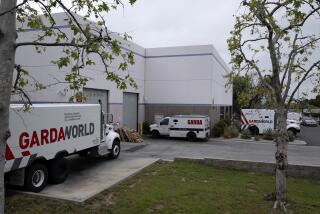Trial Reveals Web of Fraud in S&L; Failure : Crime: Westlake Thrift & Loan thrived at first, but not until after it collapsed did two investigations reveal the full extent of the firmâs questionable banking practices.
It was among the fastest-growing savings and loan companies in the nation--willing to gamble on its customers and eager to make loans many banks would not consider.
The first years of the 1980s were a boom time for Westlake Thrift & Loan of Westlake Village as it grew into a company of more than 100 employees and almost $100 million in assets.
Automobile loans were a company specialty. The word was out that Westlake Thrift virtually wanted to corner the car-loan market in Ventura County, and it almost succeeded.
âThey grew by taking a lot of low-quality loans. They were writing $64 million in auto loans a year,â one government official said. âAn 18-year-old kid with no credit could finance a new Cadillac through Westlake, and every car dealer in the county knew it.â
But something was drastically wrong. In July, 1988, Westlake Thrift went out of business. Federal regulators gave no reason for the collapse, and the exact nature of the companyâs many problems was not initially revealed.
What was not disclosed at the time of the business collapse, however, was that much more than questionable banking practices was involved in both the rise and fall of Westlake Thrift.
An FBI investigation already was well under way into allegations that at least one bank official was part of a large-scale fraud scheme involving millions of dollars in bogus loans--some of them written to people who never even existed.
This week the full story of Westlake Thriftâs demise became clearer as the financial institutionâs former president, Steven Smith, 46, of Thousand Oaks, pleaded guilty in federal court in Los Angeles to charges of conspiracy, fraud and misapplication of bank funds.
Even as Smith was entering his guilty pleas, the FBI and the U. S. attorneyâs office in Los Angeles were pressing forward with their inquiry into Westlake Thrift, as well as the activities of some officials of the thriftâs parent company, United Community Bank of Thousand Oaks.
It is too early to say where the continuing investigation will lead, officials said. Already, however, court documents and interviews provide a detailed account of what went wrong inside one of Ventura Countyâs most aggressive lending institutions.
In sketching the anatomy of a thrift and loan collapse, federal officials begin the story with a man named Walter Vladovich, 55, a Riverside businessman who allegedly set out in the mid-1980s to build the largest chain of video stores in the nation.
Vladovich, the lead defendant in a 26-count federal bank fraud indictment returned in early December, has pleaded not guilty to all charges that he conspired with Smith and others to set up the phony loan scheme. He is awaiting trial in U. S. District Court in Los Angeles.
But, according to Assistant U. S. Atty. David C. Scheper, Vladovich and Smith were the central figures in a fraudulent scheme in which $4 million in loans from Westlake Thrift were channeled into a Riverside company called Leader Video.
A variety of sources said Vladovich, who also owned a mortgage firm called Pioneer Acceptance Corp. of Riverside, allegedly began his fraudulent activities in 1984 with a banker named Henry Schneider, vice president of First United Thrift and Loan of San Francisco.
Vladovich is accused of submitting false loan packages to Schneider for video store franchises that supposedly were going to be operated by some of his own employees and others.
âAt first, he sold some legitimate stores, then he coerced employees to submit paper work that they were buying the stores,â one source told The Times. âSchneider helped him get 38 or 40 loans in all. Vladovich was the one actually making the payments and keeping the money.â
The arrangement between Vladovich and Schneider allegedly lasted about a year. Scheper said Vladovich received about $550,000 in loans and paid $15,000 in bribes to Schneider. Scheper said Schneider has agreed to plead guilty to three counts of conspiracy and fraud.
First United ultimately was absorbed by a larger bank, however, and the loans to Vladovich were stopped in 1985. About that time, sources said, Schneider introduced Vladovich to Westlake Thrift officials.
After meeting Smith, who then was a vice president of Westlake Thrift, Vladovich allegedly came up with a different scheme that involved obtaining $5,000 loan packages through Pioneer Acceptance.
The loan packages were submitted to Westlake Thrift on behalf of individuals who supposedly were going to buy 48 video movies and video equipment with which to launch their own video store businesses--a tiny inventory that alone would have warned off serious investors.
In fact, according to federal officials, Vladovich initially enlisted applicants for the loans by telling them that he would give them $1,000 in video equipment for the use of their names and would make the actual $200-a-month loan payments.
In exchange, officials said, Vladovich kept the $5,000 loans from Westlake. They said it was made clear to most of those who signed up for the loan packages that they would not actually be getting 48 movies or the chance to open a store.
As one source described it: âWhat Vladovich told customers was, âIâm trying to go public on the New York Stock Exchange. To do that, I need 100 stores. Iâm a wealthy man. Iâve got enough money to do it myself, but itâs tied up. If you fill out the loan application, you wonât have any problems. Iâll make the payments for you and give you $1,000 worth of video equipment.â â
According to Scheper, Vladovich and his salesmen processed more than 800 loans worth about $4 million. He allegedly used some of the money to pay himself a $1,800-a-month salary and to cover his business operating expenses.
âIn the beginning, the loan applicants were real people,â one source said. âSome of the first people Vladovich contacted were California Highway Patrol officers in the San Bernardino area. He made a pitch to about 35 of them and got them signed up for the free video stuff.
âThe problem was that the Highway Patrol people were asking too many questions,â the source added. âThey also were too demanding in terms of the kinds of free TVs and VCRs that they wanted. They were getting to be a real pain to do business with.â
For a while, another source said, the sales staff turned away from the Highway Patrol to Mexican workers. They asked fewer questions and were not as demanding. The cost of business was also less.
âInstead of giving them both a television set and a VCR, they just gave the Mexicans their choice of a VCR or a television,â The Times was told.
The salesmen working for Vladovich were Jerry Tulak, 29, of Ontario; George Loayza Sr., 52; and his son, George Loayza Jr., 25, both of Eagle Rock. Like Smith, all have pleaded guilty to federal fraud charges in connection with the case.
From the start, a variety of sources said, Vladovich put heavy pressure on his sales staff to write an increasing number of loan applications. The pressure allegedly increased when Vladovich needed additional funding for another business venture, a novelty company called Bric-a-Brac.
âThe salesmen had signed up members of their families by this point, and Vladovich was making the payments for them,â one source said. âThey started going to shopping malls and getting names from shoppers. It reached the point where they would make up Social Security numbers and submit the loans for fictitious people.â
Westlake Thrift, meanwhile, still was enjoying its boom period. Smith was in charge of the loan deals with Vladovich, and everything still looked good on paper. Vladovich usually made his payments on time, and Smith was receiving a large annual bonus for the loans that went through his office.
âItâs not exactly clear when Smith knew these were bad loan packages,â a source said. âBy 1986, however, he knew that Vladovich was making the payments. In early 1987, he demanded a meeting, and Vladovich said he wasnât buying the 48 movies that were supposed to be part of the deal.
âSmith told him that if he missed a payment, the loans would be cut off. Vladovich said that if he did, they would go down together and Westlake would lose more than $1 million in outstanding loans,â a source added.
Despite that confrontation, the indictment filed in U. S. District Court shows that the loan arrangement continued through the first half of 1987. Smith, however, began to distance himself from Vladovich, no longer personally signing the checks to Pioneer Acceptance.
By this time, state banking regulators had begun to look at other questionable loan practices by Westlake Thrift. The district attorneyâs office in Riverside County also had begun asking questions about Vladovichâs business activities there. And, in July, 1987, a Westlake Thrift official named Chet Adams gained access to the Vladovich files and blew the whistle internally to other bank officers.
There was, sources said, a last-minute scramble to contain the damage already done to Westlake Thrift, which involved the purchase of all of Vladovichâs businesses by the bank and isolating everybody connected to Smithâs operations.
Westlake Thrift was under siege by this point, however. Not only had the FBI investigation into criminal fraud begun, but the Federal Deposit Insurance Corp. was beginning an inquiry of its own that eventually led to the forced closure of the firm.
Smithâs relationship with Vladovich effectively was ended. But the banker continued on a course that was destined to add to his future problems. In late 1987, according to this monthâs indictment, he compounded his troubles by misappropriating $24,500 in bank funds, allegedly giving $5,000 to a female acquaintance in Orange County.
While Vladovich still faces trial, and Smith and the others indicted so far have not yet been sentenced, the guilty pleas by Smith and Vladovichâs former sales force already have led some law enforcement agencies to view the investigation of Westlake Thrift as âa classic takedownâ in a bank fraud case.
From the earliest stages, the FBIâs Ventura County office had only one white-collar crime specialist, Theodore J. Boler, assigned to the Westlake case. Boler pursued the Smith-Vladovich connections for almost two years before the indictments were returned.
âBank failure cases, particularly those resulting from fraud, are enormously difficult to investigate and prosecute,â said Gary Auer, special agent in charge of the FBIâs Ventura office. âHowever, there is always an audit trail available and records that do exist which eventually make prosecution possible.â
While the investigation has not yet ended, Auer said he thinks the Westlake Thrift probe has significance because of what it reveals about the broader problems now confronting savings and loan institutions throughout the nation.
âThis case is a classic example of the kind of fraud that has taken place throughout the country,â Auer said. âIt shows that this is not just something that happens to people in other places, but can take place right here.â
More to Read
Inside the business of entertainment
The Wide Shot brings you news, analysis and insights on everything from streaming wars to production â and what it all means for the future.
You may occasionally receive promotional content from the Los Angeles Times.










